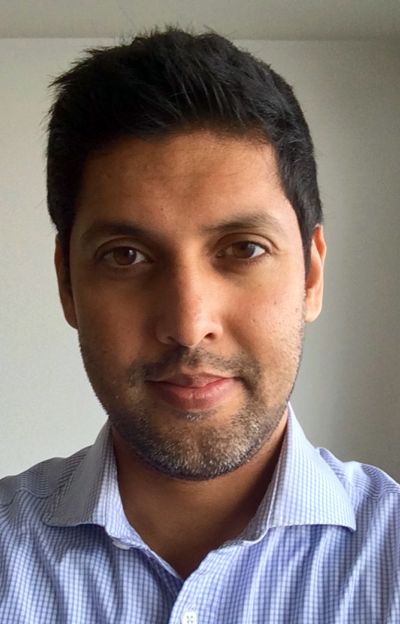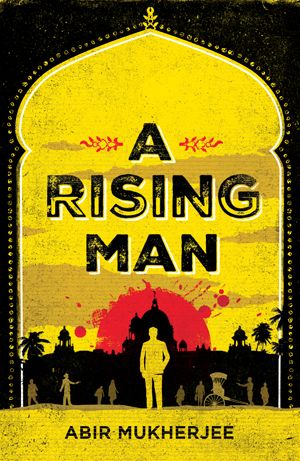
 Last February, we reported on how the previously unpublished writer Abir Mukherjee had won a crime writing competition run by The Daily Telegraph and Harvill Secker. His book, A Rising Man, has been completed and Harvill Secker will be publishing it in May next year. Becoming a crime author is a big career shift for Abir, who is an accountant by day, specialising in corporate finance. Raised in Scotland, he now lives in London. He’d always wanted to write a crime novel and finally drummed up the confidence to do so after a bit of a mid-life crisis. It was that or buying a motorbike, he tells us. We invited him over to talk about his competition win and the road to publication for A Rising Man…
Last February, we reported on how the previously unpublished writer Abir Mukherjee had won a crime writing competition run by The Daily Telegraph and Harvill Secker. His book, A Rising Man, has been completed and Harvill Secker will be publishing it in May next year. Becoming a crime author is a big career shift for Abir, who is an accountant by day, specialising in corporate finance. Raised in Scotland, he now lives in London. He’d always wanted to write a crime novel and finally drummed up the confidence to do so after a bit of a mid-life crisis. It was that or buying a motorbike, he tells us. We invited him over to talk about his competition win and the road to publication for A Rising Man…
How did victory at the Telegraph’s crime writing competition come about?
I started writing A Rising Man in September 2013, and a few weeks later I came across details of the competition, looking for new and unpublished crime writers. By that point I’d already written about 10,000 words and it seemed what I was writing fitted the competition’s entry criteria. I tidied up the first few chapters, wrote the synopsis and sent off my entry. I’d never tried writing a novel before and winning came as a huge shock. It took a while to sink in, but it also gave me the confidence to think I might be able to make a real go of writing.
What is A Rising Man all about?
The book is set in Calcutta in 1919, a time of great political upheaval in British India. It’s about the arrival of an ex-Scotland Yard detective, Captain Sam Wyndham, who’s come to India after surviving the Great War. Within a fortnight of arriving in the city, he’s faced with his first case – a high ranking British official found with his throat slit and note stuffed in his mouth warning the British to quit India.
In addition to solving this apparent assassination, the Wyndham and his officers have to investigate the death of a railway guard, murdered during an attack on a train where nothing was stolen.
What made you choose this setting?
I think it’s a fascinating place and time, unique in many respects and one that’s been overlooked, especially in terms of crime fiction. I think that period in history has contributed so much to modern India and Britain, and it was a time that saw the best and the worst of both peoples. But it’s a period that’s either brushed under the carpet or romanticised. I wanted to explore it from a middle ground and from the perspective of a man who is new to it all.
In the period that the book is set, Calcutta was still the premier city in Asia and was as glamorous and exotic a location as anywhere in the world. At the same time, it was a city undergoing immense change and was the centre of the freedom movement, a hotbed of agitation against British rule.
Tell us about how you researched it.
My parents are both from Calcutta so there was a lot of asking of questions of old family members and friends. I also made a few trips to the city and that helped me get a sense of the place. During one visit, I was lucky enough to be given access to the Calcutta Police Museum where a lot of the police documents from the period are on exhibit. That was fascinating, as the Kolkata Police today has a rather ambivalent view of its own history during that time. In terms of research though, most of that was done sitting at home and trawling the internet.

A letter from Indian revolutionaries to their victims…
What was the most interesting thing you discovered in your research that went into the book?
There was so much, it’s hard to pick just one thing. I suppose it was the mentality of the revolutionaries who were espousing armed insurrection against the British. Some of them seemed to view it in almost chivalrous terms, even going to the lengths of sending letters to people they’d robbed to raise funds, informing them that they viewed the money they’d stolen as a loan, which would earn interest at five per cent per annum and would be repaid when India was free.
And what was the most interesting thing you discovered in your research that didn’t go into the book?
Fingerprints! The world’s first fingerprint bureau was established by the Calcutta Police in 1897. That’s almost five years before Scotland Yard set up its Fingerprint Branch. The two men who developed the system of fingerprint classification, the Henry System, which is still used in most English speaking countries, were two Indians, Azizul Haque and Hem Chandra Bose. One was a Muslim, the other was a Hindu. The man who got the credit of course, was their boss, Edward Henry, who was later knighted and went on to be one of the greatest commissioners of Scotland Yard.
Who or what inspired your character Sam Wyndham and what is he like?
Sam’s a war veteran and ex-Scotland Yard detective. Life has made him a cynic – he’s scarred by his wartime experience and burdened by survivor’s guilt. He comes to Calcutta looking for a fresh start away from England.
I’m not sure what the inspiration for him was. I think he’s an outsider, someone who’s not truly at home anywhere, and I think part of that comes from my own background, being the son of immigrants to the UK. At the same time, I’m a big fan of detectives such as Ian Rankin’s Rebus, Philip Kerr’s Bernie Gunther and Martin Cruz Smith’s Arkady Renko, and I think fictional detectives to some degree need to be fish out of water. They see things differently from other people.
 What key themes did you want to explore and is there a social message to look for in the book alongside the mystery aspects?
What key themes did you want to explore and is there a social message to look for in the book alongside the mystery aspects?
I wanted to explore the effect of empire on both the rulers and the ruled, in particular, what happens when a democratic nation subjugates another, both in terms of the impact on the subjugated peoples, but just as importantly, on the psyche of the people doing the oppressing. As part of my research, I read George Orwell’s Burmese Days and his essay Shooting an Elephant which was based on his time as a policeman in Burma. Both give an insight into the moral and psychological pressures placed on those tasked with administering the colonial system. I think it’s an area that’s been relatively unexamined over the last 70-odd years.
What’s it been like seeing your manuscript worked on by a big publisher?
It’s been an amazing experience and a real education. My editor, Alison Hennessey, is fantastic and I’ve learned so much from her, including how to say more with fewer words. Overall, the book is a lot tighter having gone through the editorial process. In terms of key changes, the introduction of a particular sub plot, which adds to the complexity of the book, was Alison’s suggestion.
Would you have published on your own if you hadn’t won?
That’s a good question. I’d written about half of the first draft by the time I found out I’d won, though the rate of progress had slowed a lot. It’s hard to make time for writing in amongst the day job and family time.
I think I’d have persevered and finished the first draft and then probably tried to find an agent. I was extremely fortunate in that one of the judges, Sam Copeland of RCW, offered to represent me. Sam’s advice has been invaluable. As someone who’s come from a background of numbers rather than words, I think I’d need someone to tell me whether what I was writing was any good. As such, I don’t think I’d have had the confidence to go down the self-publishing route.
Publication is some way off but what’s next for you in terms of crime fiction?
Publication is set for May next year, but I’m keeping busy. I’m hoping to write a whole series of Sam Wyndham books, covering the period from 1919 to Indian independence. Harvill Secker has been fantastic and offered me a further two-book deal. I’m part-way through the first draft of the second novel.








